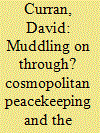| Srl | Item |
| 1 |
ID:
151524


|
|
|
|
|
| Summary/Abstract |
This article analyses direct forms of the ‘protection of civilians’ (PoC) in United Nations (UN) peacekeeping, and how this links to aspirations outlined by cosmopolitan scholarship at the turn of the twentieth century. Its main contention is that cosmopolitan conceptions of peacekeeping, which advocate more active forms of civilian protection, have faced significant challenges in the UN peacekeeping system. These challenges (internal and external) are a result of the state-based nature of the UN, and its peacekeeping practice. Therefore, the UN’s flexibility to adopt ethical practices associated with PoC can only be contained within confined boundaries. The article takes as its starting point the aspirations of cosmopolitan scholarship before outlining policy development in UN peacekeeping concerning PoC. It then explores internal and external challenges faced in operationalizing PoC in UN peacekeeping practice before arguing that the UN may be at a stage where it is ‘muddling through’ in terms of PoC. The article contributes to debates about the role of peacekeeping in global politics, through seeking to understand the possible limits of cosmopolitanism within peacekeeping practice. Moreover, it offers a contemporary understanding of where the UN has developed PoC in its deployments and what challenges remain.
|
|
|
|
|
|
|
|
|
|
|
|
|
|
|
|
| 2 |
ID:
100016


|
|
|
|
|
| Publication |
2010.
|
| Summary/Abstract |
This article presents an overview of the relationships between peacekeeping, peacebuilding and conflict resolution with an emphasis on the way in which culture and cultural analysis might be used to develop more effective and sustainable peacekeeping interventions. The article comments on the conceptualization of the role of culture in conflict resolution theory and how this has been used in attempts to address cultural barriers to effective peacekeeping in so-called first-, second- and third-generation missions. While culture has generally been defined as important in theory and practice in terms of understanding differences between actors in conflict environments, the main new argument advanced in the article is that culture, redefined specifically as peace culture, can have a more proactive role in terms of mobilizing energies for sustainable peacebuilding at different stages of the conflict spectrum. More speculatively, the article explores the idea of culture as a contributory factor in the emergence of new forms of cosmopolitan peacekeeping.
|
|
|
|
|
|
|
|
|
|
|
|
|
|
|
|